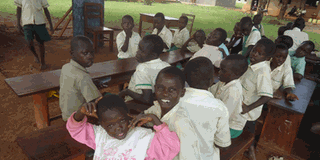Budaka schools charging for chalk

Pupils of Kisanja Primary School in Masindi District studying under a tree. A number of government-funded schools continue to face daunting challenges that impact on the education of pupils. For instance a number of schools in Budaka have been hit by a financial crisis after government delayed to remit funds. Photo by George Muzoora.
What you need to know:
Delays. More than 50 schools are charging pupils for chalk due to delays by government to release UPE funds.
BUDAKA.
Shocking revelations have emerged, showing that most schools under the Universal Primary Education in Budaka District charge not less than Shs200 per pupil to buy chalk amid an increasing financial crisis.
The Daily Monitor learnt that for the last quarter, most primary schools, about 59 of them, have not received UPE funds to address school demands, including procurement of chalk, and other requirements.
At Nyanza 11 Primary School, located in Kamonkoli Sub-county, with a total enrolment of 612 pupils, the school administration in consultation with the school management committee and the Parents’ Teachers Association agreed in a meeting held on June 15 that each pupil be charged Shs200 to buy chalk.
“The school is facing a financial crisis following government’s delay to release UPE funds. We had no option but to come up with pertinent solution to this problem and complete the term as we wait for the money,” Mr Michael Kirya, the deputy headmaster, told the Daily Monitor.
He said it was not only Nyanza facing the problem but several schools, especially those under UPE programme were in a financial crisis and could not afford basic necessities.
Mr Kirya also lashed out at parents who have taken it upon themselves to blame the school administration for coming up with the measure, saying the school could not afford to close at such a time.
“We came-up with a figure that we though was fair to our parents. But instead parents with a negative attitude are blaming the school administration and committees, saying we are exploiting them,” he said.
The PTA chairman, Mr George Otabong, said the mindset of some people [parents] is a bit hard to change, especially that they don’t expect to be charged anything under the UPE programme.
“Government sometimes delays to release funds, which as right thinking people forces us to think of alternatives,” he said.
The Budaka District inspector of schools, Mr Christopher Weere, confirmed that a number of schools were facing a financial crisis and will have to wait up to August when the money might be released.
“This is a challenge we have at the moment and most likely [schools] will receive funds in August. And if school administrators and parents agree to address the problem jointly, then there is no cause for alarm,” Mr Weere said.
Under the UPE policy, government remits money to schools which assists in the purchase of basic functions, including chalk.
However, the delay in releasing such funds has on several occasions put school in a position of bother, which usually culminates into a financial crisis.
Mr Moses Wakirembe, a parent, expressed concern over government’s continued delay to release funds for UPE schools.
some key challenges
Key challenges. According to a report - First Monitoring and Evaluation Report for Quality Enhancement Initiative, published in 2011 by Makerere University’s Institute of Social Research, a number of schools lack inspections and delays in releasing or misuse of finances might go unnoticed for months.
The report also noted that community participation in school administration had failed improve, despite calls to local management of school heads. The research realised that community participation, through School Management Committees was largely inactive since local leaders were unable to question school activities.



